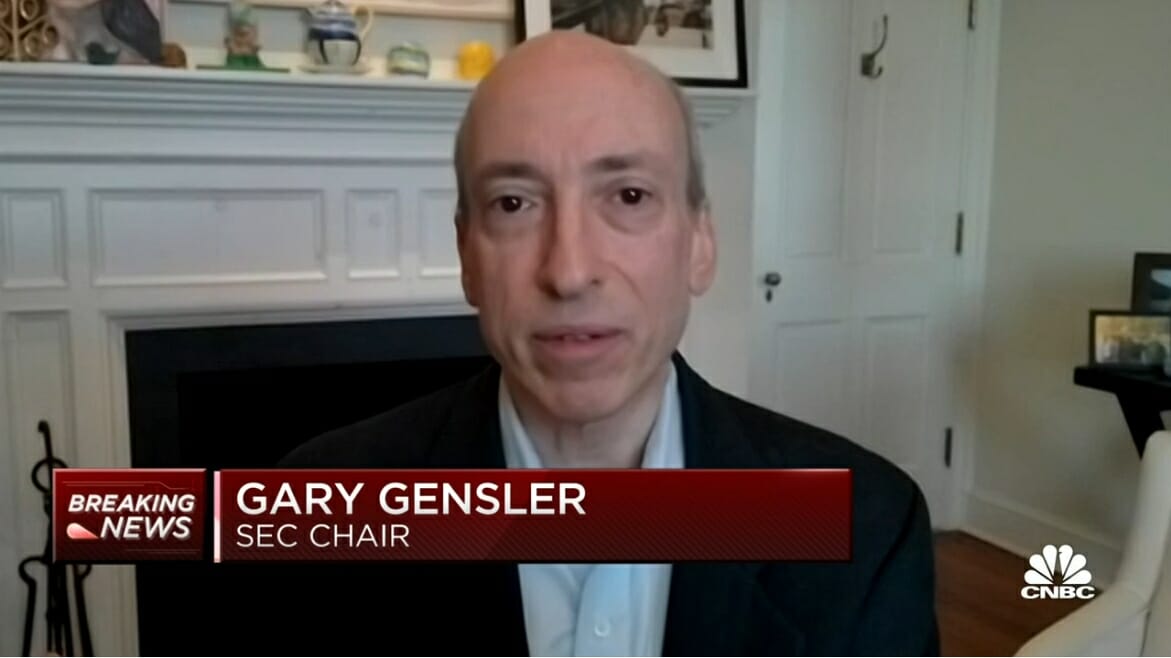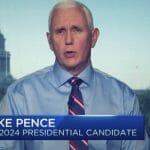Following is the unofficial transcript of a CNBC interview with SEC Chair Gary Gensler on CNBC’s “Squawk Box” (M-F, 6AM-9AM ET) today, Friday, February 10th.
SEC’s Gary Gensler On Kraken Staking Settlement: Other Crypto Platforms Should Take Note Of This
ANDREW ROSS SORKIN: Meantime, let’s talk about cryptocurrency. Cryptocurrency exchange Kraken is going to be forced now to end its crypto staking program in the US and pay a $30 million fine to settle charges from the SEC.
Q4 2022 hedge fund letters, conferences and more
The agency said Kraken had failed to register the program whereby investors earn a yield in return for locking up their tokens and allowing them to be used to facilitate transactions on the blockchain. It's the SEC’s first crackdown on staking and joining us right now is SEC Chair Gary Gensler.
We should say Bitcoin and pretty much all the crypto currencies are down on the back of this news. Chair Gensler, it's great to see you this morning. There’s a phrase online where they say tell it to me like I'm five so for those who are uninitiated into what happened here, tell it to me like I’m five. What what was Kraken doing and what was the problem that you were trying to solve?
GARY GENSLER: Andrew, what Kraken was doing was asking the American public for their coins, crypto tokens and saying I'll give you a return, 4% to 21% returns, and the problem was they were not disclosing to the investing public, the risks that the investing public was entering into and we have a basic bargain in the United States since the 1930s.
You can take whatever risks you want, companies like Kraken can offer investment contracts and investment schemes, but they have to have full fair and truthful disclosure and this puts the investors who watch your program in a better position. That's our basic bargain. They were not complying with that basic law.
SORKIN: So how does this though differ for example from some of the other firms out there including Coinbase who offer yield products?
GENSLER: Whether you call, the labels don’t matter. Long ago, the Supreme Court Justice Marshall said this so eloquently, “It's not about the labels. It's about the underlying economics.” And this really should put everyone on notice in this marketplace, whether you call it lend, whether you call it earn, whether you call it yield, whether you offer what's called an annual percentage yield, APY, that doesn't matter.
If somebody's taking their tokens and transferring it to that platform, the platform controls it, guess what happens if they go bankrupt? You stood in line at the bankruptcy court. Here's a saying in crypto that says, not your keys, not your coins. So those other platforms should take note of this and seek to come into compliance, do the proper disclosures and registration and the like.
SORKIN: Okay but here's one of the big issues as I think you know which is this staking service is going to no longer be available to customers in the US. But interestingly, they're going to still offer the same product internationally abroad outside of the United States. And so it raises this larger policy question as to whether crypto a, these types of products just move offshore.
Maybe that's what you want, and that's a good thing. But then whether what you do about the American citizenry who's then using VPNs and all sorts of other things to to skirt around what's happening here.
GENSLER: Look, we're technology neutral at the SEC, but we're clearly very focused on investor protection. 330 million Americans are our clients. These firms, Kraken knew how to register. Others know how to register, it's just a form on our website. They can come in, talk to our talented people and disclosure review teams.
And if they want to offer staking, we're neutral. Come in, register because investors need that disclosure. What are you doing with the tokens? Are you trading against the tokens? Are you borrowing against the token? Are you using them for your own purposes, and we've seen this in the crypto field so investors not only need that disclosure, but it's the law.
SORKIN: Gary, I want to read you something. This is Hester Peirce, someone you know well is a republican commissioner of the SEC—
GENSLER: I have great respect for my fellow commissioner.
SORKIN: He disagreed with your decision.
GENSLER: She.
SORKIN: Oh, she did I'm sorry. She disagreed with the decision. Let me just read you something, “Using enforcement actions to tell people what the law is in an emerging industry is not an efficient or fair way of regulating,” she says.
Moreover, “Staking services are not uniform, so one-off enforcement actions and cookie-cutter analysis does not cut it. A paternalistic and lazy regulator settles on a solution like this one in this settlement.” What, what is your reaction?
GENSLER: Well, the commissioner and I have a very good relationship. We chat regularly and have lively policy debates and debates around these matters. Let me step it back.
The SEC staff is really dedicated, serve the public, work hard staff, and we have for decades used the various tools Congress has given us to protect the investing public and if that means somebody is breaking the law, non-compliant, we do use enforcement where there were, there are authorities that Congress has given us, we do write regulations, and we do both and I would even just say if you look at the history of insider trading, a lot of what we've done around insider trading starting decades ago was through enforcement actions.
This is not something new at all. All we're saying to this non-compliant, generally largely non-compliant industry is come in and properly follow the law, disaggregate, segregate the customer funds and protect the customer funds which is what broker dealers under the law need to do.
The exchanges, register as an exchange and disaggregate those hedge fund opportunities that you're taking and market making. So there's a clear way to do this and there's forms on our website. I think it's just a talking point that the industry is using. They know how to do this. They are just choosing not to do it.
SORKIN: Well, let me ask you tell you about clarity and this is maybe a philosophical sort of broader policy perspective. I think that there is a common view that your office is using all available means effectively to keep crypto out of the mainstream financial system through enforcement and accounting rules, inspections.
Clearly, there's not real guidance yet on custody. And this may very well be a reasonable policy choice, if that's the choice. The question is, if that's a choice, why not just say it publicly?
GENSLER: We're using all available tools. We're talking directly to market participants. We take the meetings and we say, this is how you comply. There's a handful of tokens that have actually registered, the intermediaries, the storefronts, if you wish, the casinos that people are investing in and investing at, need to properly comply and disentangle these bundled products.
The business model that they've set up as is rife with conflicts. And so we've been very candid with them. I've done it in multiple speeches since I came to the agency, will continue to engage, we’re technology neutral.
But if this field has any chance of survival and success, it's time tested, rules and laws to protect the investing public, disclosure, full fair and truthful disclosure, address conflicts and disaggregate these bundled businesses and don't have your hand in the customers pocket using their funds or your own platform.
SORKIN: But in terms of the larger industry and whether the I mean, you even seem to suggest the larger industry may or may not survive. You know, one of the pieces of that survival to some degree I think has been this idea that one day there may be something like a Bitcoin ETF or something else.
Grayscale, as you know, appealing the SEC’s Bitcoin ETF decision which effectively to say it can't happen. Is there any path at which you think either that specific ETF or something like it could?
GENSLER: The pass, I'm not going to speak about one but let me generally say, Andrew, the path forward is well trodden. Whether it's large companies that you follow every day, the Apples and other tech companies, or the automobile companies, manufacturing companies, know how to register their offerings.
The exchanges, like the New York Stock Exchange and NASDAQ and so forth, know how to be compliant and come into registration. The big broker dealers and the small thousands of broker dealers, the mutual funds, dare I go on.
We have tens of thousands of registrants that properly in good faith comply, they register, they make the proper disclosures. It's time for this group to do so. The runway is getting awfully short. And we're here to try to protect the investing public.
SORKIN: And then separately, while we have you, I did want to ask you about this Wall Street Journal report that the SEC is planning to ease up on some of the climate disclosure rules that had earlier been proposed in reaction to some of the investor pushback. What is the state of play in your mind?
GENSLER: So we made a proposal about 8, 10 months ago to bring some consistency and comparability to the disclosures already happening. Climate risk disclosures, investors are making investments based on these disclosures.
We got nearly 15,000 public comments on that proposal. It is customary Andrew in each of our rulemakings that we review all that, we think through the economics, we think through the legal authorities that commenters have raised and it's quite customary to make adjustments.
We, your viewers know this that we did something about insider selling their stock and we finalized it in December. We, we adjusted from the proposal, we're taking up something next Wednesday with regard to settlement cycles, this proposal to move to what's called one day settlement from two day settlement.
SORKIN: How much of that—
GENSLER: It’s customary to make adjustments.
SORKIN: How much of that reaction, though, from investors do you think is based on the political backlash and I want to read you. This is from Patrick McHenry recently announcing a new working group for what he calls a threat to capital markets posed by the far left he says, “Progressives are trying to do with American business what they already did to our public education system using institutions to force their far left ideology on American people.
Their latest tool in these efforts is environmental, social, and governance proposals.” How much of you think of this is the political machine putting pressure on the investor class which is then putting pressure on you?
GENSLER: Look, we’re, I like to say we're merit neutral, whether it's about crypto or climate risks, but we're not investor protection neutral or capital formation neutral.
And so it's about just in this space for us, it's about bringing consistency and comparability to disclosures that are already being made about climate risks and investors seem to be today making decisions about this information, these disclosures and it's not to us about achieving anything else but some consistency and comparability and disclosure.
JOE KERNEN: But Chair Gensler, I talked with Congressman McHenry about this a couple of days ago and—
GENSLER: Chair McHenry.
KERNEN: Yes. Chair McHenry. Exactly. And he had no idea which models to use to try to assess climate risk, one year, two year, five year, ten year, fifty year, hundred year, none of the models nobody knows what models to use.
Your investors that you're talking about that want this disclose don't know what models to use. It's, I mean you’re like just searching around in a dark room with a blindfold on. It's absurd to try to, for you to try to take it upon or the agency to try to take it upon itself to to do this and it's—
GENSLER: So it's, so Joe, you raise a very good point. The disclosure proposals that we made and and as I said to Andrew, we regularly make adjustments from proposal to adoption. But the proposals we made were about disclosing if you have a transition plan to disclose and how what that plan is.
If a company doesn't have a climate transition plan the disclosure was, we don't we don't have that such a plan or a target. Some companies have targets to how to manage this. And it was if you have something to disclose it and sort of describe it and so that the investing public has the material features of those plans in that regard.
SORKIN: Okay, Chair Gensler, appreciate you joining us this morning, especially after this news broke and helping break it down and explain to us. Thanks.
GENSLER: Thank you so much.













